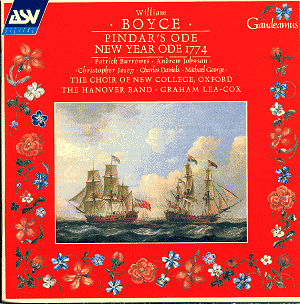Following on the heels of their outstanding recording
of David’s Lamentation over Saul and Jonathan (ASV CD GAU 208) [review]
comes this disc of Boyce’s occasional odes.
Pindar’s Ode of 1741 is recorded in the Dublin version
– a revision of the Apollo Academy first performances – which lends
greater reserves of colour to a score couched very much in the conservatism
of the high-Baroque. Boyce’s inherent dramatic impulse is very much
in evidence here – his response to Walter Harte’s translation of Pindar’s
First Pythian Ode is alive to the flair of the text and to its potential
for word painting. Allied to his very real melodic gifts Boyce was a
sensitive word setter for which he has historically received much less
than his due.
The conductor Graham Lea-Cox outlines his performance
imperatives in a well-argued note – he meets head-on the debate over
vocal timbres in a work such as this and has "sought voices that
reflect and complement the timbres of the period instruments used in
the orchestra." Implicit here is a concession that the voice types
chosen, as he admits, will not be universally admired and this mainly
centres on his use of a boy soprano and a high tenor. They certainly
add colour and variety to the vocal texture but are nevertheless problematic.
In execution of trills and in matters of upper voice strain both voice
types suffer and intonation is sometimes wayward whereas the orchestra
is always a sensitive and trenchant contributor – listen to the strings’
attack and the layering and dynamics in Charles Daniels’ arioso In Fires
of Hell and also in its following aria where the skipping and rushing
of the flames is excellently evoked by Boyce and orchestra alike. The
best singing comes from Daniels and from Michael George whose despatch
of The Pious Marriner is affecting and sensitive and one of the highlights
of the disc. The choir contribute expertly in the compact and eventful
final chorus.
The New Year Ode of 1774 is, if anything, a more concise
and dramatically cogent piece. Its two-movement overture is in the contemporary
"Symphony Style" and the work as a whole admits of superb
elisions – especially the movement from recitative to the arioso And
all that Pomp, really splendidly sung by Michael George and a sign,
once again, that Boyce’s powers were ever alert and uncompromised by
years of writing occasional ceremonial odes such as this. The aria Say,
why do millions bleed at thy command is a sturdy piece, well sung with
a softened tone by Christopher Josey. The melodic finesse, the dramatic
unity and real accomplishment of the New Year Ode is exemplified in
the final aria Myriads they see excellently despatched by the confident
boy soprano Andrew Johnson and a concluding chorus where the New College
choir really sing out to splendid effect.
Whilst not as consistently impressive as that earlier
recording by these forces (David’s Lamentation is a very special work)
this disc is yet more evidence of Boyce’s high status in eighteenth
century music making.
Jonathan Woolf


